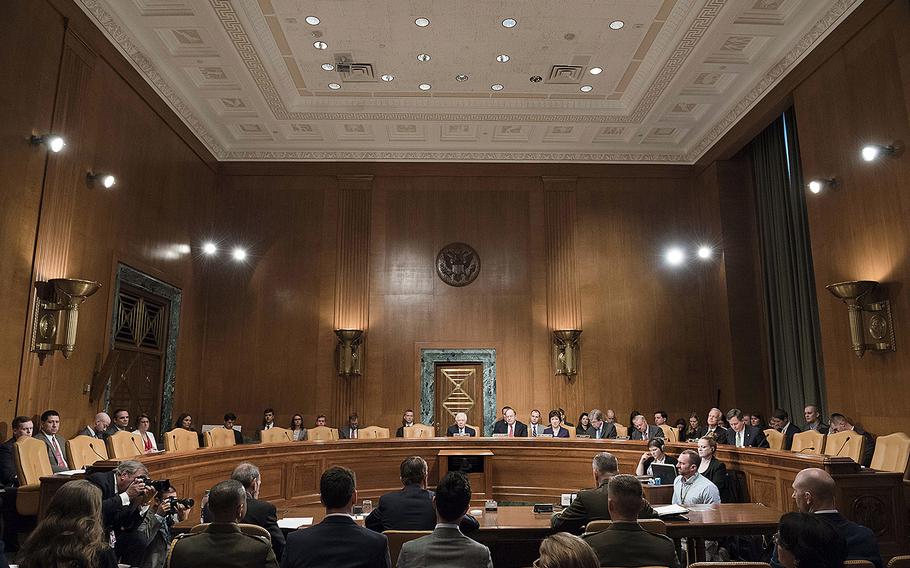
Testimony is given in the U.S. Senate Committee on Appropriations Department of Defense hearing room on April 27, 2016, as members considered the Department of Defense fiscal year 2017 budget. The Senate on Thursday, June 9, rejected a bid to add $18 billion to the military budget. (Sean K. Harp/U.S. Army)
WASHINGTON — The Senate backed away Thursday from breaking federal spending limits when it rejected a bid to add $18 billion to the military budget.
The spending hike, backed by Sen. John McCain, R-Ariz., was blocked by only a few votes and would have reversed troop drawdowns, bumped up pay raises, and bought more fighter jets, ships and helicopters.
McCain and other defense hawks in the Senate argued the military is stretched dangerously thin after 15 years of war. But billions of dollars in new spending would have violated military spending caps that have tied up the budget since 2011, when they were first pushed into law by a wave of Tea Party conservatives.
“Our military commanders have warned us we risk sending Americans into a conflict for which they are not prepared,” McCain said. “This is the reality our soldiers, airmen and Marines are facing. I say it doesn’t have to be this way.”
Without the increase, the Army will continue with plans to cut 15,000 soldiers and all servicemembers will receive a 1.6-percent pay raise, which will continue years of increases that fall below private sector wage growth.
Sen. Lindsey Graham, R-S.C., an ally of McCain, took to the Senate floor to criticize fellow lawmakers and fiscal conservatives, including the influential activist group Heritage Action, for opposing spending increases when troops do not have adequate training and equipment for combat.
“Nobody at Heritage Action is going to Iraq or Syria to fight this war,” Graham said.
Lawmakers on both sides of the aisle are warning that the military is drained from high-tempo operations and depleted by limits on spending. The budget caps created in 2011 – and modified several times since that time -- are widely criticized as “mindless” and dangerous to national security.
Meanwhile, a proposal by Democrats to match McCain’s hike with an additional $18 billion for domestic spending in the defense budget also failed to get enough votes Thursday.
After that measure failed, those lawmakers quickly abandoned any support for McCain’s hike, insisting it be met with an equal amount for bridges, heroin treatment, Zika virus programs and upgrades to the water system in Flint, Mich., where residents were exposed to lead.
“We can meet our national defense without a budget gimmick,”Sen. Barbara Mikulski, D-Md., said, using a term adopted by Democrats to deride Republican efforts to increase defense spending.
The votes mean the Senate will likely stay in line with the $602-billion defense spending limit set by law and proposed by the Pentagon and President Barack Obama. The Senate was set to pass the funding plan this week as part of the National Defense Authorization Act, a key budget and policy bill.
But there still might be political turmoil ahead for the military’s annual budget bill, which also sets pay and benefits for troops.
The White House has threatened to veto the Senate bill – even without the $18-billion hike – because it imposes restrictions on the closure of the prison at Guantanamo Bay, Cuba and slashes the size of the National Security Council, which advises the president but has been criticized by lawmakers for micromanaging the war effort in Iraq and Syria.
A veto threat also hangs over the military budget passed by the House.
Lawmakers in that chamber want to take $18 billion out of the military fund used for the war against the Islamic State group and stability operations in Afghanistan and use it for other military priorities, such as more soldiers, military training and equipment.
Troops would get a 2.1-percent pay raise – the biggest in years – and the Army would reverse plans to drawdown 15,000 soldiers, instead adding 5,000.
But the plan will cause the war effort to run out of money midway through 2017 and require a divided Congress and a new president to cobble together emergency funding for front-line troops.
Defense Secretary Ash Carter called the House budget a gamble that is “deeply troubling and flawed.”
The House and Senate must come to a final agreement on how much money to give the military before they can pass a new budget. That is expected to play out over the coming months and will likely be completed by the end of the year.
tritten.travis@stripes.com Twitter: @Travis_Tritten